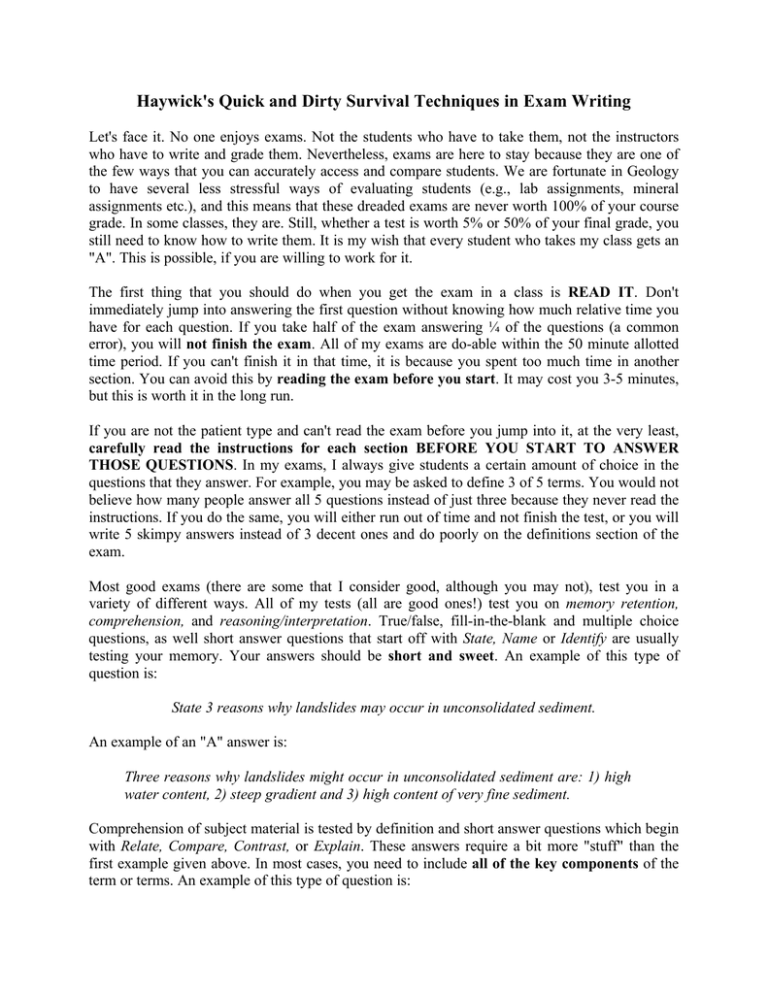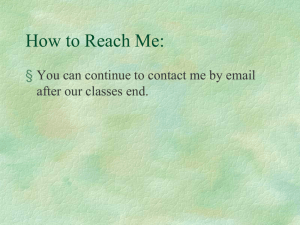Haywick's Quick and Dirty Survival Techniques in Exam Writing
advertisement

Haywick's Quick and Dirty Survival Techniques in Exam Writing Let's face it. No one enjoys exams. Not the students who have to take them, not the instructors who have to write and grade them. Nevertheless, exams are here to stay because they are one of the few ways that you can accurately access and compare students. We are fortunate in Geology to have several less stressful ways of evaluating students (e.g., lab assignments, mineral assignments etc.), and this means that these dreaded exams are never worth 100% of your course grade. In some classes, they are. Still, whether a test is worth 5% or 50% of your final grade, you still need to know how to write them. It is my wish that every student who takes my class gets an "A". This is possible, if you are willing to work for it. The first thing that you should do when you get the exam in a class is READ IT. Don't immediately jump into answering the first question without knowing how much relative time you have for each question. If you take half of the exam answering ¼ of the questions (a common error), you will not finish the exam. All of my exams are do-able within the 50 minute allotted time period. If you can't finish it in that time, it is because you spent too much time in another section. You can avoid this by reading the exam before you start. It may cost you 3-5 minutes, but this is worth it in the long run. If you are not the patient type and can't read the exam before you jump into it, at the very least, carefully read the instructions for each section BEFORE YOU START TO ANSWER THOSE QUESTIONS. In my exams, I always give students a certain amount of choice in the questions that they answer. For example, you may be asked to define 3 of 5 terms. You would not believe how many people answer all 5 questions instead of just three because they never read the instructions. If you do the same, you will either run out of time and not finish the test, or you will write 5 skimpy answers instead of 3 decent ones and do poorly on the definitions section of the exam. Most good exams (there are some that I consider good, although you may not), test you in a variety of different ways. All of my tests (all are good ones!) test you on memory retention, comprehension, and reasoning/interpretation. True/false, fill-in-the-blank and multiple choice questions, as well short answer questions that start off with State, Name or Identify are usually testing your memory. Your answers should be short and sweet. An example of this type of question is: State 3 reasons why landslides may occur in unconsolidated sediment. An example of an "A" answer is: Three reasons why landslides might occur in unconsolidated sediment are: 1) high water content, 2) steep gradient and 3) high content of very fine sediment. Comprehension of subject material is tested by definition and short answer questions which begin with Relate, Compare, Contrast, or Explain. These answers require a bit more "stuff" than the first example given above. In most cases, you need to include all of the key components of the term or terms. An example of this type of question is: Compare and contrast the definitions of a mineraloid and of a mineral. An example of an "A" answer is: Both minerals and mineraloids are naturally occurring, inorganic solid materials. Minerals are further defined as materials which possess unique chemical composition and crystalline structure. They (e.g., halite, hematite etc) are distinguished from one another on the basis of these criteria. Mineraloids are either non crystalline (e.g., opal) or lack a unique chemical composition (e.g., bauxite, limonite). Key points (those vital to your answer) are indicated by bold text. Note: this question clearly requires more thought and time to answer and it is therefore worth more points than a simple multiple choice question. Reasoning and interpretation are tested via essay questions. They usually start off with Discuss, Demonstrate, Analyze, Speculate or Prove. These are the questions that are most dreaded by students, but they should be the ones that are most welcome. There is plenty of opportunity for you to shine on a question like this, and "A" grade answers are possible for every one in the class. But, in order to get this "A", you have to do more than list things. I expect thought out answers, not material that is simply regurgitated from the lecture notes or the textbook.. It is impossible for you to do a good job on a discussion question if you only spend 5 minutes at it. In my tests, essay questions always have one or two parts to them and they are worth a lot (usually 35% of the test). Here's an example of an essay question: Discuss 3 possible alternative energy forms that could conceivably replace conventional energy sources. Compare the pros and cons of each method and explain whether they are presently feasible replacements for fossil fuels. There is no single answer that is correct for this question. Indeed, there are several different answers that are all correct.. Some people may not agree on the possible alternative energy sources. Others may not agree on if they are presently feasible. That's okay. Essay questions usually encourage personal opinions. As long as you stay on topic, and keep your discussion reasonable (i.e., you argue your points convincingly), you are likely to remain firmly planted in "A" territory. What many students fail to appreciate is that instructors have much more flexibility marking discussion questions than any other type of question. You can be absolutely wrong, and still get credit (at least some credit) for your essay. You should like essay questions not hate them! Here are 2 other helpful hints that will aid you in your quest for an "A" on the essay question. 1) Figures almost always help your answer and they should be included even if the question does not specifically ask for them. Make sure that you fully label your sketches and where possible, refer to them in your discussion. 2) Before you start writing, make a short outline on a scrap piece of paper (or on the back of a blank page in the exam) itemizing the key points that you will address in your answer. Take the time to arrange them into a good order before you start to write your answer. The best answers ("A"-grade) sandwich this material between an introduction and a conclusion. Want to know what constitutes an "A" answer? Here's my version: Three possible alternative energy sources that could conceivably replace conventional energy sources are 1) solar power, 2) wind power and 3) tidal power (sketch 1). All three processes share the advantage of not producing any unwanted emissions such as carbon dioxide or sulfur dioxide, but there are numerous disadvantages to them as well. Solar power and wind power are both terribly expensive to set up and yield very poor energy returns for the financial investment. In addition, both methods require large open spaces and enormous amounts of steel and concrete to build. Solar generating stations would have to be set up in areas subject to strong and constant winds (e.g., Great Plain States). In my opinion, neither solar power nor wind power are presently viable replacements for fossil fuel power energy stations because most people today do not live in the desserts or on the grass lands where the alternative power stations would have to be set up. They would, however, be useful for small communities or individual buildings or houses. Tidal power is feasible for coastal areas that are subject to very high tidal ranges such as the coast of France or the Bay of Fundy in Nova Scotia, but there are undetermined possible effects to the nearby coastal regions. The biggest concern is that the power stations may "back-up" water and raise local sea level. This could increase shoreline erosion in areas adjacent to the power station. At the present time, none of the present alternative power generation schemes are feasible for replacing fossil fuel facilities. However, as environmental concerns grow, solar, wind and/or tidal power plants may become more widespread. I personally feel that we are likely to become more dependent upon nuclear power as it is cheaper and requires less overall maintenance, that is, provided that it doesn't explode.

